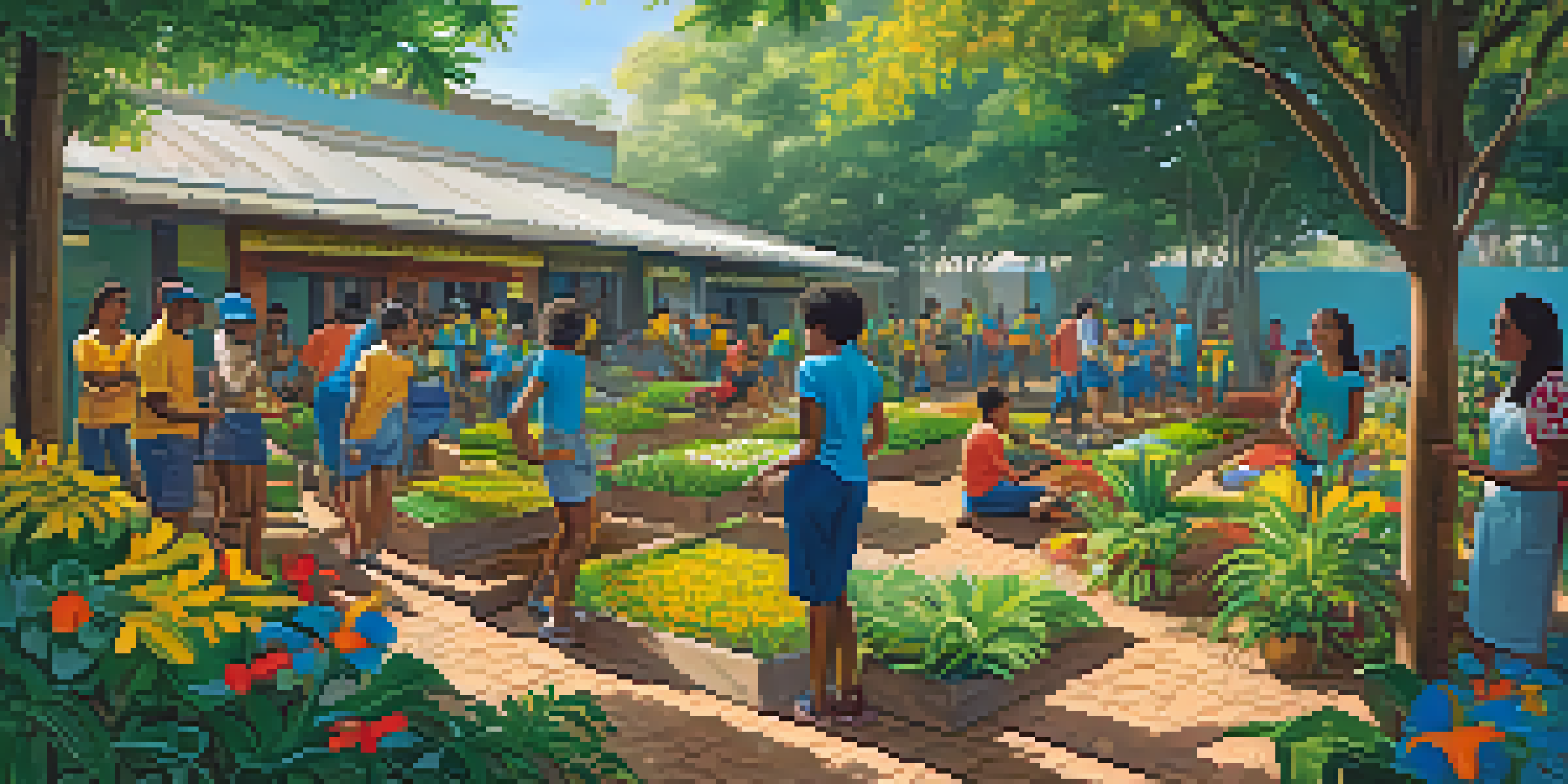Understanding Volunteer Tourism: A Guide to Brazil's Rich Culture

What is Volunteer Tourism and Why It Matters
Volunteer tourism, often called 'voluntourism', combines travel with community service. It's a way for travelers to give back while exploring new cultures. This form of tourism not only benefits the local community but also offers enriching experiences for the volunteers.
The best way to find yourself is to lose yourself in the service of others.
In Brazil, this concept has gained traction, providing opportunities for tourists to engage in meaningful projects. From environmental conservation to education initiatives, volunteers can make a tangible impact. This dual benefit helps foster a sense of global citizenship and responsibility among travelers.
Moreover, volunteer tourism allows individuals to immerse themselves in the local culture. By participating in community-led projects, volunteers gain a deeper understanding of Brazil's diverse societal fabric. It's an experience that goes beyond typical sightseeing.
Brazil: A Tapestry of Cultures and Traditions
Brazil boasts a rich cultural mosaic, influenced by Indigenous, African, and European heritages. Each region of the country brings its unique customs, traditions, and flavors to the forefront. This diversity is one of Brazil's greatest assets, making it an exciting destination for volunteer tourism.

For instance, in Bahia, you can experience vibrant Afro-Brazilian culture through music, dance, and festivals. Meanwhile, the Amazon region showcases Indigenous traditions, offering insights into sustainable living practices. Engaging with these cultures provides volunteers with unforgettable memories and lessons.
Voluntourism Enriches Lives
Volunteer tourism allows travelers to give back to communities while gaining enriching cultural experiences.
Understanding Brazil's cultural landscape is essential for volunteers. It fosters mutual respect and appreciation between visitors and locals, ensuring a more meaningful exchange. This connection enriches the volunteer experience, making it truly transformative.
Popular Volunteer Opportunities in Brazil
Brazil offers a variety of volunteer opportunities, catering to different interests and skills. Common projects include teaching English, wildlife conservation, and community development. Whether you're passionate about education or environmental protection, there's something for everyone.
Traveling – it leaves you speechless, then turns you into a storyteller.
For example, volunteers can work with local schools, helping children improve their language skills and gain confidence. Alternatively, conservation projects in the Amazon rainforest allow volunteers to protect endangered species and promote sustainable practices. These hands-on experiences are incredibly rewarding.
Participating in these projects not only benefits the local community but also enhances the volunteer's personal growth. Volunteers often return home with new perspectives, skills, and a sense of accomplishment. It's a win-win situation that highlights the essence of volunteer tourism.
Preparing for Your Volunteer Trip to Brazil
Preparation is key to a successful volunteer experience in Brazil. Start by researching the organization you plan to work with, ensuring they align with your values and goals. Understanding the local customs and language can also enhance your experience, making interactions smoother.
Packing the right gear is essential, too. Lightweight clothing, sturdy shoes, and necessary supplies can make a big difference during your stay. Additionally, having a basic understanding of Portuguese can help you connect with locals, making your time in Brazil even more rewarding.
Brazil's Cultural Diversity Awaits
Engaging with Brazil's rich cultural mosaic enhances the volunteer experience and fosters mutual respect.
Lastly, consider your health and safety. Ensure you have the required vaccinations, travel insurance, and emergency contacts. Being well-prepared sets the stage for a fulfilling and enjoyable volunteer experience.
Cultural Etiquette: Do's and Don'ts in Brazil
Understanding cultural etiquette is crucial for a positive experience in Brazil. For instance, greeting locals with a friendly 'Olá' and a smile can go a long way. Brazilians are known for their warmth and hospitality, so reciprocating this friendliness is important.
However, it's also essential to be mindful of personal space and body language. Brazilians often stand close during conversations, which may feel different to some travelers. Being aware of these nuances can help avoid misunderstandings and foster better connections.
Moreover, try to respect local customs and traditions. Participating in community events or festivals can show your appreciation for their culture. This willingness to engage and learn will leave a lasting impression on both you and the community.
The Impact of Volunteer Tourism on Local Communities
Volunteer tourism has a profound impact on local communities in Brazil. Projects often address pressing social issues, such as education access and environmental sustainability. By contributing their time and skills, volunteers help create lasting change.
For instance, educational programs can empower children and youth, providing them with opportunities for a better future. Similarly, conservation efforts help protect Brazil's unique ecosystems, ensuring that future generations can enjoy its natural beauty. These initiatives show how volunteer tourism can lead to meaningful transformations.
Impact on Local Communities
Volunteer projects in Brazil address social issues, leading to lasting change and economic benefits for locals.
Moreover, the presence of volunteers can stimulate local economies. As tourists spend money on accommodations, food, and activities, they contribute to the community's overall well-being. This economic boost, coupled with social improvements, highlights the holistic benefits of volunteer tourism.
Reflections: Personal Growth Through Volunteer Tourism
Many volunteers find that their experiences in Brazil lead to significant personal growth. Engaging with diverse communities and tackling real-world challenges can shift perspectives and foster empathy. This transformative journey can change how individuals view themselves and their place in the world.
For example, overcoming language barriers or adapting to new environments can build resilience and confidence. Volunteers often return home with newfound skills, not just in their respective fields but also in communication and adaptability. These lessons are invaluable, shaping their future endeavors.

Additionally, the connections forged during this time can create lifelong friendships and networks. The shared experience of volunteering often leads to deep bonds, enriching both personal and professional lives. Ultimately, the impact of volunteer tourism goes beyond the immediate contributions made.